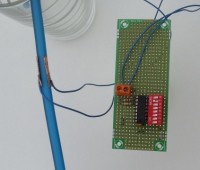Capacitive Liquid Sensor [140130]

Following up a suggestion contributed to the Siphon-based Rain Meter project, here is a simple capacitive sensor.
Following up a suggestion contributed to the Siphon-based Rain Meter project, here is a simple capacitive sensor.
The principle is classic: an oscillator is controlled by a capacitor which in turn is controlled by some physical parameter. In this case the capacitor is formed by two electrodes stuck on opposite sides of a thin silicon hose. When the hose is empty the capacitor value will be slightly different then when the hose is filled with a liquid. The change in frequency that results at the output of the oscillator can be measured.
The quality of the output signal depends of course on the construction of the sensor. With the one shown in the photo a 1.5% frequency shift was obtained. The hose has an external diameter of 6 mm and an internal diameter of 4 mm. The electrodes are two bits of self-adhesive copper tape of about 20x7 mm because that was the width of the copper tame used. Longer electrodes may be more sensitive.
This sensor has been tested with water and gasoline.
Here the oscillator is formed by a classical 4060. A DIP switch allows the selection of an output frequency suitable for the measuring system. With a fixed capacitor of 1nF in place of the sensor a frequency of 2.5 kHz was measured on Q7.
An Arduino Uno can be used for experimentation and a simple sketch is attached below.
A small PCB was designed. The Eagle files can be downloaded below.



Discussion (0 comments)